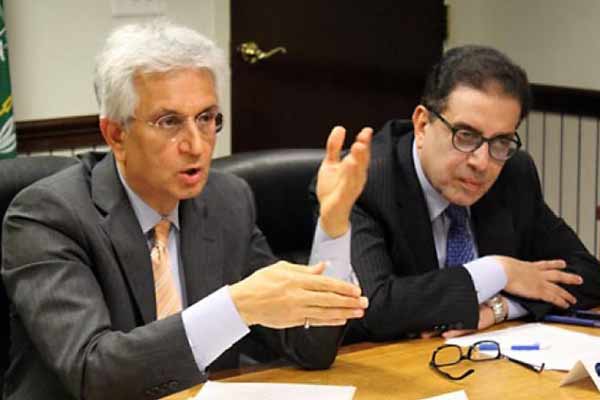
Dr Merza Hasan (left) with Salah Sarhan at the roundtable.
Private sector must become Mena engine of growth: Expert
WASHINGTON, May 4, 2017
The private sector should be encouraged to become an engine of economic growth in the Middle East North Africa (Mena) region, a senior World Bank official has said.
Speaking as part of the National US-Arab Chamber of Commerce (NUSACC) Expert Roundtable Series in Washington, Dr Merza Hasan, dean of the board of executive directors at the World Bank Group, shared his candid perspectives on economic trends in the Mena region, as well as how the World Bank and International Monetary Fund (IMF) intend to help address current challenges.
Hasan pointed out that the challenges facing the region represent opportunities for the private sector. "This is how business looks at investment: Which sectors are facing challenges vs growing, and where are the gaps in terms of skills, technology, and management.
“The future of the region lies in the ability of its leaders to set a bold technological agenda and take the initiative to bring about meaningful change,” he said.
“For the past 20 years, at least, change has been the only constant in the Mena region,” Hasan stated. This has resulted in peaks and valleys for the region’s economy, he said, making projections for the economic future of the region unpredictable.
“Thomas Jefferson said that too much government is no government,” noted Hasan. “So how do we shrink government in the lives of individuals, relying more on the private sector? This is the question that we should be asking for a successful future.”
“Capital is a coward,” he noted, so “major reforms are needed for tariff and taxation systems. We have also added to the conversation the topic of good governance in the corporate world.”
As the Mena region charts a course for economic transformation, Hasan said, the public and private sectors must now, more than ever, come together to lay the foundation for long-term economic development.
Hasan noted that the Mena suffered significantly during the 2008 global financial crisis, which was compounded by the economic and political effects of the Arab Spring, beginning in 2011.
He noted that “a single event that began in Tunisia quickly spread across the region,” underscoring the interconnectedness of the Mena region and its economies. Because of a contradiction between economic reform and political reform, and due to the lack of societal institutions, he said, “Growth in the regional economy was exclusive rather than inclusive, serving only the top 10 per cent and having little effect on the bottom 90 percent.”
Today, Hasan suggested, economic growth in the Mena region is lagging. The World Bank estimates overall growth in Mena Gross Domestic Product (GDP) to be under three percent for the third year running. Historically low oil prices, conflicts, and the global economic slowdown make short-term prospects of recovery unlikely, he opined.
The region’s share of global exports fell from 2.2 percent in 1995 to 1.8 percent in 2008. But those figures are misleading, Hasan cautioned. If you exclude the oil exports, the Mena region would be the lowest trading region in the world. Mena's total exports within the region remained constant, at about 10 percent.
Hasan was more optimistic about the future. “The more you have growth in the GDP, the better is your ability to put jobs into your economy, which also brings shared prosperity,” he said. “There is movement in the GDP, and the trend is growing, so this is a very positive sign when it comes to economic growth.”
Hasan highlighted water scarcity as one of the major issues facing the Mena region. “There’s a huge challenge when it comes to water availability, especially with climate change,” he suggested. “Doing something about the water situation starts with water management and water recycling. Seventy percent of water used in the Arab world is dedicated to the agricultural sector; therefore, we need to be more efficient when it comes to irrigation.”
Moreover, he said, conventional large-scale desalination is cost-prohibitive and energy intensive, so it is not very viable for poor countries in the Mena region.
Hasan emphasised the importance of economic restructuring with an allusion to the so-called Mena youth bulge. “About sixty percent of the region’s population is under the age of 25, and the mean is 22 years old, compared to the world mean, which is about 28 years old,” he said.
“This is a youth population, so we need to define many programmes through the prisms of education and markets to create jobs that will integrate youth into the economy. This will lead to a boost in production sectors and will provide opportunities to diversify these economies, he noted.
“We are seeing a huge potential now for vocational studies, educational studies, and technological skills training,” he went on to say. “We need to offer the right infrastructure and environment to succeed."
Women’s empowerment is an important issue for the World Bank, and Hasan highlighted the crucial role that women must play in an economy if a country is to prosper. “Think of it as half of your engine not working,” he said. “This is what it’s like for women in the region to be unable to engage in the economy.”
He suggested that US companies “take a nuanced view” of the region, which is “full of lucrative opportunities” but is often misunderstood or misrepresented in the US.
NUSACC president and CEO David Hamod thanked Hasan for his long relationship with NUSACC and his leadership at the World Bank, with which the National US – Arab Chamber of Commerce has partnered on multiple occasions in recent months. Hamod also thanked Ambassador Salah Sarhan, Chief Representative of the Arab League in Washington, DC, for serving as co-host of this important event. -TradeArabia News Service







